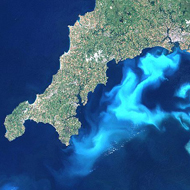
Research into cyanobacteria 800 million years ago
Scientists at the University of Bristol say they have uncovered the evolutionary key that lead to all complex life on Earth.
It is a long held belief that an increase in oxygen led to complex multicellular life towards the end of the Precambrian era 4600 - 541 million years ago.
But it remained a mystery as to why this oxygen increase occurred.
Now a new study of the genomic data of cyanobacteria may hold the answer.
They found that around 800 million years ago, cyanobacteria spread throughout the ocean, colonising two thirds of the planet.
Some were capable of transforming atmospheric nitrogen into bioavailable nitrogen in large quantities. This in turn delivered "nitrogen fertiliser" to the ecosystem, releasing the mass increase of oxygen that sparked the evolution of complex life.
Dr Patricia Sanchez-Baracaldo who led the research said the team used genomic data to reconstruct the relationships between cyanobacteria. Using molecular techniques, the team were able to date when these species first appeared in the geological record to around 800 million years ago.
"We have known that oxygenic photosynthesis – the process by which microbes fix carbon dioxide into carbohydrates, splitting water and releasing oxygen as a by-product – first evolved in freshwater habitats more than 2.3 billion years ago.
"But it wasn’t until around 800 million years ago that these oxygenating cyanobacteria were able to colonise the vast oceans (two thirds of our planet) and be fertilised by enough bioavailable nitrogen to then produce oxygen – and carbohydrate food – at levels high enough to facilitate the next 'great leap forward' towards complex life.
"Our study suggests that it may have been the fixing of this nitrogen 'fertiliser' in the oceans at this time that played a pivotal role in this key moment in the evolution of life on Earth," said Dr Sanchez-Baracaldo, a Royal Society Dorothy Hodgkin Research Fellow in Bristol's Schools of Biological and Geographical Sciences.
Co-author, Professor Andy Ridgwell added: "The timing of the spread in nitrogen fixers in the open ocean occurs just prior to global glaciations and the appearance of animals.
"Although further work is required, these evolutionary changes may well have been related to, and perhaps provided a trigger for, the occurrence of extreme glaciation around this time as carbon was now being buried in the sediments on a much larger scale."
Dr Sanchez-Baracaldo said: "It's very exciting to have been able to use state of the art genetic techniques to help solve an age-old mystery concerning one of the most important and pivotal moments in the evolution of life on Earth.
"In recent years, genomic data has been helping re-tell the story of the origins of life with increasing clarity and accuracy. It is a privilege to be contributing to our understanding of how microorganisms have contributed to make our planet habitable."
Their paper, "A Neoproterozoic Transition in the Marine Nitrogen Cycle" by Patricia Sanchez-Baracaldo, Andy Ridgwell and John Raven has been published in Current Biology



 The veterinary mental health charity Vetlife is inviting the veterinary community to join it for a sponsored cold-water dip.
The veterinary mental health charity Vetlife is inviting the veterinary community to join it for a sponsored cold-water dip.